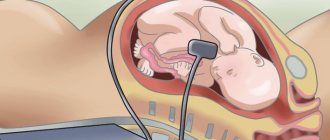Why does nervousness increase during pregnancy?
During pregnancy, as mentioned above, the hormonal background of the expectant mother changes greatly. Hormonal changes occur in any organism in which a new life is born, so any woman in one way or another becomes vulnerable psychologically. During the period of bearing a baby, people around you, and especially relatives and friends, need to be very sensitive towards the woman.
Already at the moment of fertilization, the value of the hormone gonadotropin jumps sharply. Its indicator reaches its maximum at 7-10 weeks. Increased concentration greatly affects a woman’s physical condition and changes her psychological background, making her mood changeable. Many people feel nauseous and their taste preferences change.
Reference! The hormone progesterone has a great influence on the mood of the expectant mother. Its level fluctuates from low to high at high speed, which dramatically affects mood. An important role is played by estriol, a natural antioxidant produced throughout the entire period of gestation.
Ultrasound in the 2nd trimester of pregnancy
Allows you to see how the baby is developing: examine his arms and legs, count his fingers, and also whether all his organs are formed (heart, lungs, brain) and whether there are any deviations from the norm. The obstetrician-gynecologist also evaluates the condition of the placenta, which performs the most important functions: on the one hand, a protective barrier, on the other, it is responsible for the delivery of nutrients and oxygen to the baby.
Contrary to the popular stereotype, short-term exposure to ultrasonic waves is absolutely safe for the fetus, as confirmed by clinical studies. After all, these are the same sound waves of a certain frequency that we do not catch, but, for example, bats use these waves (and even greater intensity) to fly throughout their lives. An ultrasound machine allows you to visualize soft tissues and vital anatomical structures, which can only be assessed by scanning with these waves. However, you still shouldn’t do ultrasounds too often during pregnancy. As part of prenatal diagnostics in the second trimester, once at 18-20 weeks is enough, it should be the second.
Causes of increased irritability:
- in the 1st trimester
In the first trimester of pregnancy, women are the most whiny and irritable. This is due to a sharp jump in hormonal levels and adjusting it to the most acceptable one. Frequent predetermining factors of bad mood during this period include:
- Peculiarities of the woman's psyche. If the expectant mother, before the period of conception, had a tendency to unexpected changes in mood, then she will bring this state into her beginning pregnancy. The psyche of such young ladies is quite resistant to stress, therefore it is not so dangerous for emotional health in general.
- Previous bad pregnancy experience. If a woman has previously experienced miscarriage, then the stress received during this period automatically turns into a new pregnancy. In this case, coping with the emotional fear of loss becomes very difficult. A woman listens to her body every minute in order to avoid previous sensations.
- Unexpected pregnancy. If conception occurs unplanned, then upon learning about this, the woman experiences stress, either joy or panic. It’s good if the baby is long-awaited. In this case, the emotional background quickly returns to normal and the stress disappears. But if the child is unexpected, then a storm of emotions simply covers the confused mother. Here you need to quickly decide to accept the situation, otherwise you can cause irreparable harm to the child.
- The role of a strong personality. If a woman is accustomed to hard work and solving independent problems, then the understanding that she will have to wait a while causes her a slight psychological shock. To cope with emotions, you should get used to the idea of motherhood and your feminine essence: softness and weakness.
- in the 2nd trimester
By mid-pregnancy, women tend to calm down a little. They are already fully aware of the role of the expectant mother and their psyche returns to normal. However, in the second trimester of pregnancy there are very frequent emotional breakdowns, which are accompanied by irritability on the part of the expectant mother.
Attention! A woman may begin to be offended by everyone around her. She is literally hurt to the core by the words of her colleagues that she is absent-minded or has put her coffee cup in the wrong place. Even if there was no reproach, the woman will still find a hint of resentment in the advice or hint.
Sounds and smells can suddenly begin to irritate, and even quiet noises cause great bewilderment, even to the point of hysteria. If in the second trimester a woman continues to be bothered by toxicosis, then irritability intensifies against this background. At the same time, vomiting can lead to a constant feeling of hunger, which mom tries to eat with something tasty and satisfying. In turn, an addiction to sweets and starchy foods significantly adds pounds to the scale, which also adversely affects a woman’s well-being and her emotional background.
- in the 3rd trimester
The third trimester is quite a difficult test for a woman. Her weight noticeably increases, and her stomach begins to pull down, it becomes difficult to stand on her feet for a long time, and she feels the urge to lie down more. It is precisely because of excess body weight and the enormous load on the legs that a woman experiences severe discomfort and leads to irritation.
Quite severe swelling is inevitable, especially in cases where a woman is forced to spend time at sedentary work, and there is no opportunity for physical exercise. At the same time, after work, a pregnant woman is burdened with household responsibilities (cleaning, cooking), which put emotional pressure on the psyche and provoke reasonable nervous breakdowns. It is important for men to support their loved one, help her with household chores, and even transfer some functions onto their shoulders.
An early meeting with the baby adds a note of apprehension to the mother’s mood: she is worried about the normal process of childbirth and the successful birth of the child. Every day, worries accumulate, and the closer the period of childbirth comes, the more stress and worries a mother has in her head.
Will my breasts continue to grow?
Yes, breasts grow at the same intensity in the second trimester due to an increase in the volume of the mammary glands and fat deposition. It is these changes that prepare the expectant mother for feeding her baby.
The skin on and around the nipples will become darker. A woman may notice the appearance of peculiar tubercles around her nipples. These are glands that secrete a special substance that prevents the skin of the nipples from drying out.
A yellowish liquid may also begin to be released - an intermediate form of milk (colostrum), which plays an important role in the first days of the baby’s life. Having a laxative property, colostrum helps the newborn get rid of meconium (original feces), which consists of epithelial cells, prenatal hair, mucus, amniotic fluid, bile and water digested in the prenatal period.
What to do if a pregnant woman is irritable?
With severe irritation, a woman’s mood changes, fussiness and panic appear, sleep is disturbed and tears appear in her eyes. It is urgent to deal with the symptoms that have overtaken mommy in order to avoid consequences. Experts recommend adhering to the following rules of conduct:
- Relax. You need to take a comfortable position and distract yourself from all thoughts. To do this, you can turn on an interesting film with a positive orientation, go for several sessions of a relaxing massage, take a walk in a nearby park or public garden, and turn on soothing music. You can simply take a warm shower or sit in a bath with your favorite scent of foam.
- Do what you love. This could be a trip to the store or beauty salon. Returning to your hobby can also be considered a useful activity. It is important to find something you like that will completely relax both body and soul, give you harmony and peace.
- Talk it out. It is very important for a woman to tell people around her about all her accumulated fears and assumptions, especially her partner. A man should listen carefully to his wife, without necessarily saying anything in response. It will be enough to nod or console the worried woman. This method works flawlessly. Not a single girl can resist the understanding and attentiveness of her chosen one.
- Try to remember the funniest and most exciting moments from your life. When there is no one to talk to, and melancholy simply fills everything inside, you need to try to take out from your memories the most amazing moments that can immediately correct the “plight.” Sometimes 10 minutes of this process is enough for mommy to calm down and all the functions of her body to return to normal.
- Protect yourself from negative information. Try to react as little as possible to the surrounding space. You cannot watch TV with sad news, or listen to sad music on the radio. It is best to sit in peace and quiet, it is better to turn on videos about animals, birds, small children.
What are stretch marks and can they be prevented?
Some areas of a pregnant woman's body naturally grow and enlarge. In such places, the skin becomes tense and the elastic fibers underneath are torn. This is how stretch marks are formed - stripes with indentations on the skin. Stretch marks usually appear on the abdomen and breasts, the areas most susceptible to growth during pregnancy.
This is a fairly common problem, although not every pregnant woman develops stretch marks. It is impossible to completely prevent the appearance of unpleasant stripes on the skin.
The main thing you can do is control your weight. Do not gain more weight than what your doctor recommends. There are many lotions and oils available in the cosmetic industry to prevent stretch marks, but the effect of such products has not been proven. However, it is worth noting that keeping the skin well hydrated will reduce itching.
Typically, after childbirth, stretch marks become less noticeable. In some cases they disappear completely.
When will I feel my baby move?
Just in the middle of the second trimester, a pregnant woman begins to feel her baby. The first tremors are more like trembling movements deep in the stomach. Over time, the sensations intensify.
Of course, the child had moved before, but it was very weak, almost imperceptible. Usually, women who give birth for the second or third time can feel the first tremors much earlier, because they are already familiar with this sensation. The day of the first tremors should be marked on the calendar and the doctor should be told about this at the next consultation so that he can transfer the data to the pregnancy chart.
What other changes can you expect?
Skin problems do not bother all pregnant women. Typically, such changes completely disappear or decrease in intensity after the birth of the child. Common skin problems during pregnancy include:
- dry skin on the abdomen;
- acne;
- increased sensitivity to the sun. Because of this, the skin burns much faster in the sun. When spending a long time outdoors, you should always take sunscreen with you;
- a dark line (“linea nigra”) from the navel to the pubis right in the middle of the abdomen and dark spots on the face (sometimes called the “mask of pregnancy”). This is melasma. It occurs due to the action of estrogen (the hormone responsible for preparing a woman’s body for childbirth and then for lactation).
Often dry skin on the abdomen is accompanied by itching. However, this may be caused by cholestasis (reduced bile flow from the liver) and gestational diabetes (a carbohydrate metabolism disorder that occurs during pregnancy). You should be careful with these symptoms and consult a doctor if you suspect any complications.
Will my interest in sex return?
Due to unpleasant symptoms such as morning sickness and vomiting, frequent mood swings and lack of energy, a woman may experience decreased sexual activity. She simply does not want sex due to emotional or physical condition and fatigue. However, many women note a return to the desire to have sex in the second trimester.
Doctors say that sex is not contraindicated regardless of the stage of pregnancy. But only the attending physician can say for sure. There are individual situations when sex is prohibited: threat of miscarriage, multiple pregnancies, bleeding.








